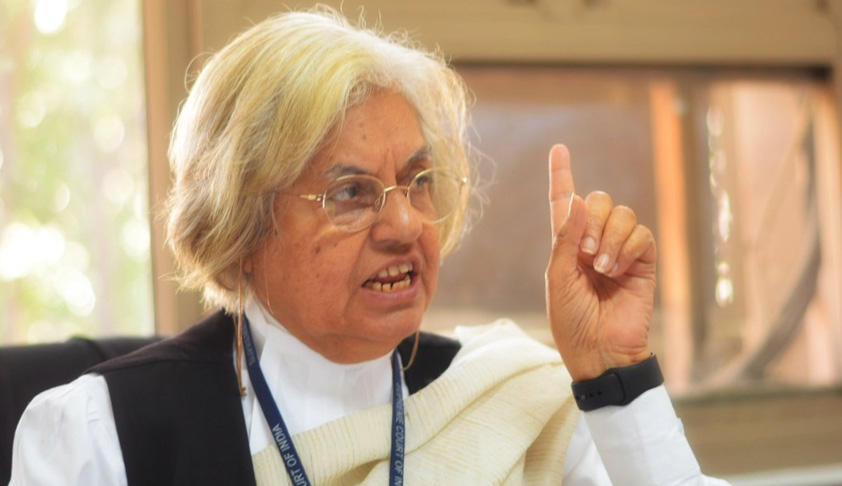On 22nd February, controversial Senior Supreme Court advocate Indira Jaising delivered the 29th Justice Sunanda Bhandare Memorial Lecture at the India International Centre. During her speech, she came out with the same old rhetoric of fear mongering by reiterating that the Indian Constitution is under threat from those responsible for upholding it. In her speech, she mentioned that this is happening through both formal and informal means. As an example of a formal method, she referred to the amendment to the Citizenship Act, which provides fast-track citizenship to persecuted minorities coming from the neighboring countries that included Bangladesh, Pakistan and Afghanistan while excluding Muslims.
Indira Jaising also stated that a ‘Hindu Rashtra’ cannot exist under a secular Constitution, as it contradicts the fundamental principles laid out in India’s governing framework. She also seemed unhappy that with the new criminal laws, Bharatiya Nyaya Sanhita, Bharatiya Nagarik Suraksha Sanhita, and Bharatiya Sakshya Adhiniyam arguing that they failed to decolonize certain legal issues, such as marital rape, which remains unaddressed in the legal system.
She also fear-mongered against anti-conversion laws, stating that they disproportionately affect minority communities and limit religious freedom. Moreover Indira Jaising further went up to subtly target former Chief Justice of India, DY Chandrachud stating that judges seeking divine guidance while making legal decisions is not in line with constitutional principles.
However, none of her concerns and attempt of fear mongering fell in line with factually sane realities. As far as the Citizenship Amendment Act is concerned, the act is meant to provide citizenship to non muslims who are persecuted on religious lines on a daily basis. The three countries that are included in the citizenship amendment act are Pakistan, Bangladesh and Afghanistan and all the three mentioned countries have Islam as their official state religion neglecting other religions. Secularism in these countries are absent and cases of religious persecution like forced conversions against non muslims is prevalent in large numbers.
Also,how come the anti-conversion law goes against minorities? In the majority of the countries, it is the minority community which fears conversion but India sees a peculiar case of the Minority community feeling threatened by anti conversion laws. Indira Jaising’s remarks against former Chief Justice too seemed off mark. She brought the incident of the 20th of October where the Chief Justice of India while addressing the residents of the Kanhersar village in Maharashtra revealed that he sought divine guidance for a resolution during the Ram Janmabhoomi dispute for a resolution. Indira Jaising presented this as some sort of religious bias Former Chandrachud underwent while delivering the Ram Janmabhoomi judgement. Such assertions are both absurd and laughable. Indira Jaising should have gone to study the judgment in depth and examine the substantial evidence presented before the apex court, which ultimately guided the decision in favor of Ram Janmabhoomi.
When faced with difficult decisions, it is natural to seek guidance from the divine, who transcends the material world. Prayer helps lift us beyond worldly struggles, allowing us to approach decisions with clarity and peace of mind. This is exactly what Chief Justice DY Chandrachud did. Faced with delivering a resolution in one of India’s most controversial cases, he sought divine assistance to gain the courage and insight needed to reach the correct verdict. Moreover, it is former CJI’s fundamental right to practise his religion which is guaranteed under Article 25 of the Indian constitution.
Senior Advocate Indira Jaising has got a controversial past. She is notorious for standing up for anti-social elements.
1. Coming in support of Yakub Memon
Indira Jaising was among the legal voices who opposed the hanging of Yakub Memon, the 1993 Mumbai blasts convict. She argued that procedural lapses and the hasty execution raised concerns about due process and fairness. She was part of the group of activists and lawyers who sought a last-minute reprieve for Yakub Memon.
2. Call for Clemency for Nirbhaya Convicts
Indira Jaising asked Asha Devi, the mother of the 2012 Nirbhaya gang rape victim to forgive the rapists of her daughter just as Sonia Gandhi forgave Nalini, a convict in the Rajiv Gandhi assassination case. Asha Devi angrily rejected her advice, saying that Indira Jaising had no right to advise her on the matter.
3. Support for Afzal Guru
Islamo-Leftist ecosystem have been fanboys of Terrorist Afzal Guru who carried out Parliament attacks. Afzal Guru, was found guilty and hanged for his role in the 2001 Indian Parliament attack. But Indira Jaising questioned the fairness of his trial and execution, arguing that he did not receive proper legal representation.
4. Foreign Contribution Regulation Act (FCRA) Violation Allegations
Indira Jaising and her NGO, Lawyers Collective, came under scrutiny when the Central Bureau of Investigation (CBI) filed a case against her and her husband, Anand Grover, for violating the Foreign Contribution Regulation Act (FCRA). The government accused them of misusing foreign funds, which led to the suspension of their NGO’s FCRA license.
5. Legal Representation of Anti-Nationals in the Bhima Koregaon case
Indira Jaising defended anti-social elements arrested in the Bhima Koregaon case, such as Sudha Bharadwaj and Gautam Navlakha, who has Maoist links.
